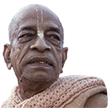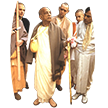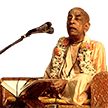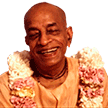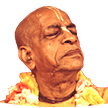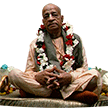Taking Sannyasa - an essential subject: Difference between revisions
(Created page with "Category:Essential Subjects <!----------------------- edit below this line -----------------------> <!------------------------ begin introduction text below --------------...") |
(Vanibot #0041: Moves Choose Another box to the end) |
||
| Line 2: | Line 2: | ||
<!----------------------- edit below this line -----------------------> | <!----------------------- edit below this line -----------------------> | ||
<!------------------------ begin introduction text below ------------------------> | <!------------------------ begin introduction text below ------------------------> | ||
After fulfilling his responsibility to produce a nice child, one should take sannyāsa and engage in the perfectional paramahaṁsa stage. paramahaṁsa refers to the most highly elevated perfectional stage of life. There are four stages within sannyāsa life, and paramahaṁsa is the highest order. The Śrīmad-Bhāgavatam is called the paramahaṁsa-saṁhitā, the treatise for the highest class of human beings. The paramahaṁsa is free from envy. In other stages, even in the householder stage of life, there is competition and envy, but since the activities of the human being in the paramahaṁsa stage are completely engaged in Kṛṣṇa consciousness, or devotional service, there is no scope for envy. | |||
Srila Prabhupada's books, lectures, conversations and letters offer a comprehensive presentation of this essential subject as seen in the Vaniquotes '''[[Vaniquotes:Category:Taking Sannyasa|Taking Sannyasa]]''' category. An introduction from his books is given below in the following | Srila Prabhupada's books, lectures, conversations and letters offer a comprehensive presentation of this essential subject as seen in the Vaniquotes '''[[Vaniquotes:Category:Taking Sannyasa|Taking Sannyasa]]''' category. An introduction from his books is given below in the following 8 quotes. | ||
<!-------- end introduction text and don't touch next three lines ---------> | <!-------- end introduction text and don't touch next three lines ---------> | ||
== Quotes from Srila Prabhupada's books == | == Quotes from Srila Prabhupada's books == | ||
<!----------------- edit quote boxes below this line -----------------> | <!----------------- edit quote boxes below this line -----------------> | ||
{{VaniQuotebox| | {{VaniQuotebox|Renunciation was exhibited by Lord Caitanya Mahaprabhu when He stayed with Advaita Prabhu after taking sannyasa. All the devotees there wanted Him to stay a few days longer, but Lord Caitanya left without hesitation|Renunciation was also exhibited by Lord Caitanya Mahāprabhu when He stayed with Advaita Prabhu after taking sannyāsa. All the devotees there wanted Him to stay a few days longer, but Lord Caitanya left without hesitation. The conclusion is that although the Supreme Lord has unlimited kindness for His devotees, He is not attached to anyone. He is equally kind to His innumerable devotees all over the creation. '''(Śrīmad-Bhāgavatam 4.30.43)'''}} | ||
{{VaniQuotebox| | {{VaniQuotebox|In Kali-yuga the injunction is that no one should accept sannyasa. Of course, those who actually follow the rules and regulations must take sannyasa. Generally, however, people are unable to accept sannyasa life|In Kali-yuga the injunction is that no one should accept sannyāsa. Of course, those who actually follow the rules and regulations must take sannyāsa. Generally, however, people are unable to accept sannyāsa life, and therefore Caitanya Mahāprabhu stressed, kalau nāsty eva nāsty eva na-sty eva gatir anyathā. In this age there is no other alternative, no other alternative, no other alternative than to chant the holy name of the Lord: Hare Kṛṣṇa, Hare Kṛṣṇa, Kṛṣṇa Kṛṣṇa, Hare Hare. '''(Śrīmad-Bhāgavatam 3.24.35)'''}} | ||
{{VaniQuotebox| | {{VaniQuotebox|Both the soul and the Supersoul are transcendental to the material world. This is to be understood in the human form of life, especially when one takes sannyasa|Both the soul and the Supersoul are transcendental to the material world. This is to be understood in the human form of life, especially when one takes sannyāsa. A sannyāsī, one who has understood the self, should be engaged in elevating the self and associating with the Superself. Our Kṛṣṇa consciousness movement is meant for elevating the living being for promotion back home, back to Godhead. Seeking such elevation is one's duty in the human form of life. '''(Śrīmad-Bhāgavatam 7.15.40)'''}} | ||
{{VaniQuotebox| | {{VaniQuotebox|At Kaliya Lake, many people mistook a fisherman for Krsna. When some respectable people came to see Sri Caitanya Mahaprabhu, they expressed their opinion that when one takes sannyasa, he becomes Narayana. Their mistake was corrected by the Lord|At Kālīya Lake, many people mistook a fisherman for Kṛṣṇa. When some respectable people came to see Śrī Caitanya Mahāprabhu, they expressed their opinion that when one takes sannyāsa, he becomes Nārāyaṇa. Their mistake was corrected by the Lord. In this way, their Kṛṣṇa consciousness was awakened, and they could understand that a sannyāsī is simply a living entity and not the Supreme Personality of Godhead. '''(Caitanya-caritāmṛta, Madhya-līlā 18)'''}} | ||
{{VaniQuotebox| | {{VaniQuotebox|According to the Vedic system, before coming to such a stage (when the vital force within the body becomes weak) one should leave home and take sannyasa to preach the message of God for the duration of life|According to the Vedic system, before coming to such a stage one should leave home and take sannyāsa to preach the message of God for the duration of life. However, if one sits at home and is served by his beloved wife and children, he certainly becomes weaker and weaker due to sense gratification. '''(Śrīmad-Bhāgavatam 4.28.2)'''}} | ||
{{VaniQuotebox| | {{VaniQuotebox|A very good example is set here: the husband goes away, taking the sannyasa order for self-realization, but his representative, the son, who is equally educated, remains at home to deliver the mother|A very good example is set here: the husband goes away, taking the sannyāsa order for self-realization, but his representative, the son, who is equally educated, remains at home to deliver the mother. A sannyāsī is not supposed to take his wife with him. At the vānaprastha stage of retired life, or the stage midway between householder life and renounced life, one may keep his wife as an assistant without sex relations, but in the sannyāsa order of life one cannot keep his wife with him. '''(Śrīmad-Bhāgavatam 3.24.40)'''}} | ||
{{VaniQuotebox| | {{VaniQuotebox|A person who is very eager to accept sannyasa, who is detached from worldly activities, who has no desire for any kind of material facilities, and who is thus saved from repeated birth and death is known as Asrama|A person who is very eager to accept sannyāsa, who is detached from worldly activities, who has no desire for any kind of material facilities, and who is thus saved from repeated birth and death is known as Āśrama. When a sannyāsī lives in a beautiful, solitary place in the forest and is freed from all material desires, he is called Vana. A sannyāsī who always lives in the forest and renounces all connection with the world in order to be elevated to the heavenly planets, where he can live in the Nandana-kānana, is called Araṇya. '''(Caitanya-caritāmṛta, Madhya-līlā 6.73)'''}} | ||
{{VaniQuotebox| | {{VaniQuotebox|According to Vedic civilization, the ultimate perfection of life is to take sannyasa, but at the present moment people do not know why sannyasa is accepted. They think that one accepts sannyasa to escape social responsibilities|According to Vedic civilization, the ultimate perfection of life is to take sannyāsa, but at the present moment people do not know why sannyāsa is accepted. Because of misunderstanding, they think that one accepts sannyāsa to escape social responsibilities. But one does not accept sannyāsa to escape from responsibility to society. '''(Śrīmad-Bhāgavatam 7.13.34)'''}} | ||
<!----------------- edit quote boxes above this line -----------------> | <!----------------- edit quote boxes above this line -----------------> | ||
| Line 30: | Line 30: | ||
'''Taking Sannyasa - [[Vaniquotes:Category:Taking Sannyasa|explore more within this category]]'''. | '''Taking Sannyasa - [[Vaniquotes:Category:Taking Sannyasa|explore more within this category]]'''. | ||
{{EsentialSubjectTotal}} | {{EsentialSubjectTotal}} | ||
<div style="float:left;"> | |||
{{EssentialSubjectnav}} | |||
</div> | |||
__NOTOC__ | __NOTOC__ | ||
__NOEDITSECTION__ | __NOEDITSECTION__ | ||
Latest revision as of 17:52, 22 November 2020
After fulfilling his responsibility to produce a nice child, one should take sannyāsa and engage in the perfectional paramahaṁsa stage. paramahaṁsa refers to the most highly elevated perfectional stage of life. There are four stages within sannyāsa life, and paramahaṁsa is the highest order. The Śrīmad-Bhāgavatam is called the paramahaṁsa-saṁhitā, the treatise for the highest class of human beings. The paramahaṁsa is free from envy. In other stages, even in the householder stage of life, there is competition and envy, but since the activities of the human being in the paramahaṁsa stage are completely engaged in Kṛṣṇa consciousness, or devotional service, there is no scope for envy.
Srila Prabhupada's books, lectures, conversations and letters offer a comprehensive presentation of this essential subject as seen in the Vaniquotes Taking Sannyasa category. An introduction from his books is given below in the following 8 quotes.
Quotes from Srila Prabhupada's books
Taking Sannyasa - explore more within this category.
Vanipedia has now over 903 introductory articles compiled from Srila Prabhupada's books under the series titled Essential Subjects. All these articles can be seen in the Table of Content on the right side of this article and also here in this Umbrella Category. Browse through them to relish the breadth and depth of Srila Prabhupada's teachings - There is a subject for everyone.
